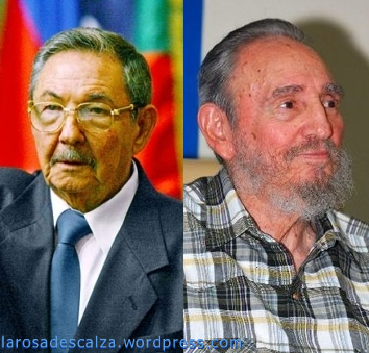 Rebellion in the “Polish”
Rebellion in the “Polish”
Various weeks had passed with normality in the “Polish”. My life was similar to the routine-driven life of any other prisoner, until I realized that if I wanted to get out of that hell I was forced to live in with the least amount of damage as possible, then I had to change my own methods. I began to read the Bible thoroughly, as well as writings by our apostle, Jose Marti (and any other book I could get my hands on).
I would begin each of my days by reading the Bible. Afterwards, I would do some physical exercises, eat lunch, rest after the lunch, and then I would once again go back to reading. From time to time, I would join in on playing chess with some of my cell companions. We would shout out each of our moves from whichever cell we were being kept at and this would profoundly annoy the guards, but we would ignore their scoldings.
During one afternoon, the guard on shift — Infante — suggested that if other guards turned up the volume on their radios, then this would drown out and confuse our voices whenever we screamed out our chess moves. They ended up agreeing on this method, and they turned up their radios as loud as possible, leading us to put an end to our game, for listening to the sound being broadcast through their radios was a real torture for us inmates.
Suddenly, everything began to change around us. The chief of our particular detachment- sub lieutenant Ricardo Martinez- decided to not care for coming around our cells to check us, perhaps intentionally. The press would not reach our hands, as well as letters written to us. Medical assistance fell below the level of “least frequent” and no one would give us a response in regards to this situation.
One night, we listened to “Mesa Redonda” being broadcast through national TV and we were stupefied. The former minister of exterior relations, Felipe Perez Roque, confirmed the existence of a series of penitentiary services- out of which only a few were actually respected (and irregularly). Alexis Rodriguez Fernandez had the idea to summon the minister and he managed to sneak a note to each of us asking for our suggestions. We all supported the initiative of our brother-in-cause, and many common prisoners agreed as well.
Since there were a few weeks left until any of us had the opportunity to a family visit and since the situation was only getting worse, we decided to carry out a hunger strike in order to demand our rights to have these services which the government itself mentioned through the voice of Felipe Perez Roque. We were shocked to see that out of the 16 of us who were in the “Polish”, all but one joined the strike (and this one person was an informant to the guards).
The guard who was on watch noticed our behavior during breakfast. Manuel Ubals Gonzalez was the first of us to refuse his breakfast, and later we all followed. I am certain that Garvey , the Interior Order functionary, quickly informed his superiors about our attitudes because a State Security official rapidly arrived on the scene, but he did not ask anything.
Later, during lunch, we did the same thing. Officials from the Penitentiary Direction did not show up anywhere near our cells to discuss matters. Perhaps they thought that we would give up our stance, but we were determined to take our protest up to the last consequences: our demands would be met or we would simply never eat again.
Half an hour after refusing to eat dinner they began to come get us individually, putting us in rooms where, much to our surprise, we were to meet with the Head Council, our re-educator Ricardo Martinez, the political police official, and another State Security guard from Matanzas.
When it was my turn, I told them the same things the others had said, but I bumped into something I was not expecting. They actually gave me the benefit of the doubt and blamed the detachment chief for the situation, assuring that it would be fixed. Diosdado Munoz More, the director of Aguica, told me that I must eat in order to prove that I had ended my hunger strike. My response was that I would only eat in the same and only place I eat- my cell. An argument then broke out between them and me, which I was not expecting. I refused to eat where they wanted me to and I took on this strict position to avoid any future manipulations. They then suggested I eat in the lunch area where prison workers eat, but I was not a prison worker, I was a prisoner in a jail of maximum security.
My attitude cost me three days in complete isolation in a dungeon where light did not enter and where I would have no drinking water available. I would have never imagined that such dungeons existed in my country.
During the day, I could barely see anything, and when night would fall it was a petrifying darkness. The horrible odor of the bathroom was making me ill and since I did not have water, I could not clean it up a bit. I must add that in order to drink water I had to ask a few common prisoners to fill up three bottles for me and I would take the chance to shower myself with one of those bottles. During the 72 hours in which I resided in that dark hole, I came to know each and every one of the cracks on the cell walls and I imagined the suffering felt by men who had previously been condemned to live there.
When they removed me from that putrefied hell, I was returned again to the “Polish”, and I was received by my companions with applause and I was truly in awe because I was not relying to count on so much solidarity. Afterwards, I was able to tell my partners about my experiences, as well as to listen to their own experiences after being interviewed by the officials. Out of all them, I was the only one who was told to eat at the lunchroom. Food was taken to the cells of all the others. We reached the conclusion that maybe such treatment was reserved for me because they thought I had been the one who called for the strike.
Due to our rebellious stance, the officials of Aguica avoided leaving common criminals by our sides for too long, and they also avoided confronting us. We knew we had won the first battle, but we had to publicly call out the regime. Family visits were the only opportunities we had left, and we then began to elaborate another plan to achieve our objective.
Translated by Raul G.
NOTE: Pablo Pacheco was one of the prisoners of Cuba’s Black Spring, and the initiator of the blog “Behind the Bars.” He now blogs from exile in Spain and his blog – Cuban Voices from Exile – is available in English translation here. To make sure readers find their way to his new blog, we will continue to post some of his articles here, particularly those relating his years in prison in Cuba.
March 21, 2011

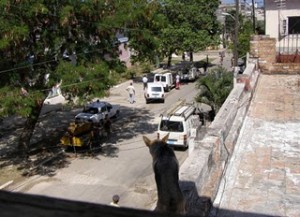 Migdalia Estévez and her husband, Ramon Suarez, were waiting for “Cuba’s Reasons,” the TV series aired on Mondays on the island. They understood what subversion is, the media war, and the imperialist maneuvers. But they still don’t understand the government’s bitter struggle against cable TV or satellite dishes.
Migdalia Estévez and her husband, Ramon Suarez, were waiting for “Cuba’s Reasons,” the TV series aired on Mondays on the island. They understood what subversion is, the media war, and the imperialist maneuvers. But they still don’t understand the government’s bitter struggle against cable TV or satellite dishes.
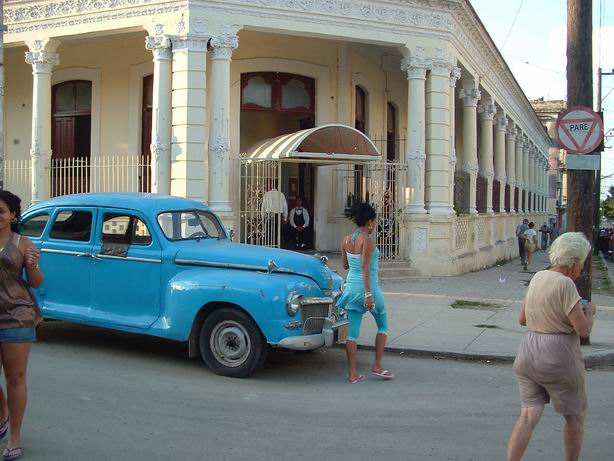
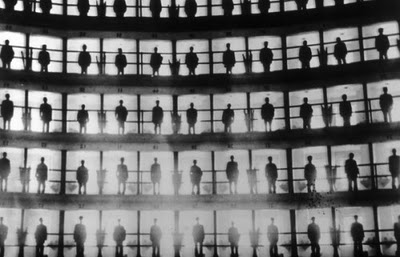
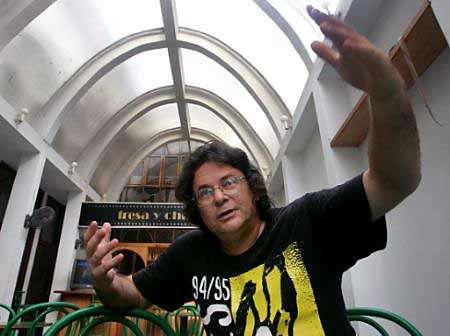
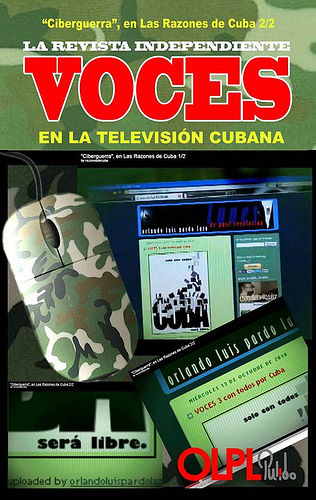
 Last Tuesday, March 15th, I went to the Hotel Parque Central, in the heart of Havana. It was my intention, as in previous occasions, and until just a few days ago, to use the Internet, after getting a prepaid card at the rate of a mere 8CUC an hour for a moderately fast connection.
Last Tuesday, March 15th, I went to the Hotel Parque Central, in the heart of Havana. It was my intention, as in previous occasions, and until just a few days ago, to use the Internet, after getting a prepaid card at the rate of a mere 8CUC an hour for a moderately fast connection. Source: Guama
Source: Guama Appearing on television is always an event in the life of an ordinary person. I thought I would be fearful, nervous, anxious. But when I saw my blog header and my photo on “
Appearing on television is always an event in the life of an ordinary person. I thought I would be fearful, nervous, anxious. But when I saw my blog header and my photo on “ Exiled in Spain, the Cuban ex-prisoner of conscience Normando Hernandez, just like the rest of his brothers-in-cause, lived a harsh reality behind the bars of the Cuban jail cells. Now, his new life in Spain is supposed to be full of freedoms and opportunities, but his case has proven otherwise. The Spanish government has denied this freedom fighter his right to freely travel in and out of the country on various occasions, the most recent being in regards to an intellectual conference being held in Norway. Spanish officials have declared that the reason for which he was denied from being able to participate was because of his “International Protection in Spain” and “Political Asylum” status. If this really were the reason, Normando points out that this excuse does not make much sense, for travel permits exist which would allow such trips.
Exiled in Spain, the Cuban ex-prisoner of conscience Normando Hernandez, just like the rest of his brothers-in-cause, lived a harsh reality behind the bars of the Cuban jail cells. Now, his new life in Spain is supposed to be full of freedoms and opportunities, but his case has proven otherwise. The Spanish government has denied this freedom fighter his right to freely travel in and out of the country on various occasions, the most recent being in regards to an intellectual conference being held in Norway. Spanish officials have declared that the reason for which he was denied from being able to participate was because of his “International Protection in Spain” and “Political Asylum” status. If this really were the reason, Normando points out that this excuse does not make much sense, for travel permits exist which would allow such trips. Rebellion in the “Polish”
Rebellion in the “Polish”